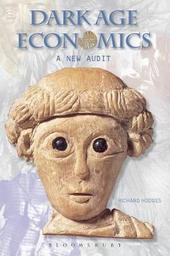
|
Dark Age Economics: A New Audit
Paperback / softback
Main Details
| Title |
Dark Age Economics: A New Audit
|
| Authors and Contributors |
By (author) Dr Richard Hodges
|
| Physical Properties |
| Format:Paperback / softback | | Pages:176 | | Dimensions(mm): Height 234,Width 156 |
|
| Category/Genre | Medieval European archaeology
Economic history |
|---|
| ISBN/Barcode |
9780715636794
|
| Classifications | Dewey:330.9401 |
|---|
| Audience | | Professional & Vocational | | Postgraduate, Research & Scholarly | |
|---|
| Illustrations |
c. 25 bw illus
|
|
Publishing Details |
| Publisher |
Bloomsbury Publishing PLC
|
| Imprint |
Bristol Classical Press
|
| Publication Date |
5 July 2012 |
| Publication Country |
United Kingdom
|
Description
In Dark Age Economics: a new audit, Richard Hodges reviews and enlarges upon the debate that continues since his ground-breaking Dark Age Economics: the origins of towns and trade was first published. This book pays special attention is given to new archaeological evidence for managing agrarian economies and how this shaped the evolution of the earliest medieval urban communities. Ranging across western Europe, with an emphasis upon the role of the Church as an agent of change, the author advances a new thesis about the shift from the consumption economies of Antiquity to the emphasis on production in the Middle Ages.
Author Biography
Richard Hodges is Professor and Director of the Institute of World Archaeology, University of East Anglia. He is the editor of this series and author of many books including "Dark Age Economics", "The Anglo-Saxon Achievement", "Towns and Trade in the Age of Charlemagne", "Goodbye to the Vikings" and (with Riccardo Francovich) "Villa to Village", all published by Duckworth.
ReviewsRichard Hodges' Dark Age Economics: The Origins of Towns and Trade (1982) was one of the most influential and provocative works on early medieval archaeology in the latter part of the 20th century . . . Dark Age Economics: A New Audit sees Hodges survey the impact of his work and summarise his current thinking on the issues that it raised. For each, it makes for a stimulating and thought-provoking read . . . [The book] provides an extraordinary wealth of ideas for further cogitation; like its predecessor, it deserves to be read and discussed extensively. -- A Merrills, University of Leicester * Medieval Archaeology * This is a distinguished archaeologist's overview of the current assessment of the early medieval economy since his Dark Age Economics: The Origins of Towns and Trade AD 600-1000 (1982) ... Perhaps of greatest interest to readers will be Chapter 4, which reports recent scholarship on monasteries, focusing on San Vincenzo at Volturno in Beneventum as it adjusted its production to its changing environment in the eighth and ninth centuries. -- David Tandy, University of Leeds * Religious Studies Review *
|